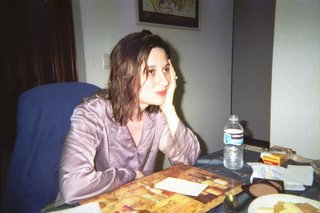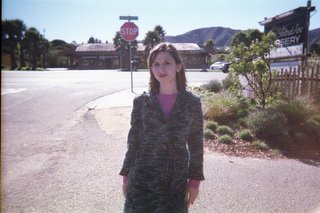The world is so taken up of late with novels and romances, that it will be hard for a private history to be taken for genuine, where the names and other circumstances of the person are concealed, and on this account we must be content to leave the reader to pass his own opinion upon the ensuing sheet, and take it just as he pleases. - from the author's preface to
Moll Flanders.
To add to the whole discussion about whether or not the actual life experiences of an author are relavant to the text, and in response to econoclast's comment about Daniel Defoe framing his novels as "true stories," I decided to re-read "Moll Flanders," which is my favorite Defoe novel. To be honest, I'm not sure if Defoe posited (DISCLAIMER: being in English-major-dork mode, I am required to say "he posited" when in fact I mean "he
said") that the stories were really-truly real, or just "real," wink-wink. I could research it, but if memory serves, I'm inclined to go with the latter. I studied the early novel rather extensively in college, but at the time I also enjoyed many recreational pharmaceuticals, which might have caused me to confuse Daniel Defoe with Willem Defoe, or for that matter caused me to confuse the oeuvre of Daniel Defoe with my left buttock. (Not that I would grossly exaggerate about my use of drugs, because that would be wrong. I was, however, in prison in 3 states, unlike that liar
James Frey. Hence the tear I have tattooed under my eye, for the homeys I cut down in prison).
Daniel Defoe clearly wanted Moll Flanders to be sympathetic and taken seriously, which she remains despite her "thieving and whoring." Moll Flanders is a classic of the picaresque tradition, which is one of my all-time favorites. For those of you who might not be familiar with the picaresque, because you were smart enough to study subjects that might allow you to "get a real job," and "have more than $1.27 in net assets," a picareque novel is essentially a story in which a social underdog type travels around and has varied adventures, while offering a satirical commentary on the events and people he/she encouters. In Defoe's novels in particular, the main character always achieves a kind of redemption, usually of a religious nature, in the end.
What occured to me is that novelists and "memoirists" like James Frey and
JT Leroy are, essentially, the direct heirs to the 17th-century picaresque. Their characters are margnialized by addiction, cross-dressing, prostitution, or all of the above; they travel around the United States and act as the
moral arbiters (ahem)of their circumstances. Leroy's
oeuvre, which is just a stupid French world for "oeuvre," would have been a biting commentary on child prostitution in West Virginia, or something, if only it were even remotely true. (While the author never said these stories were nonfiction, the idea that it was based on actual life experiences was strongly implied by the author, publisher, and others.)
The moral salvation which occurs at the end of either Leroy or Frey's works (either through rehab, or moving in with a social worker and her cross-dressing husband, etc.) simply reinforces the eerie ties between these novels and Defoe's picaresque. Defoe, after all, was raised and educated by puritans, and Moll Flanders spends a part of her time in the plantations in the new colonies of Maryland and Virginia. Because Defoe's father was a Dissenter (essentially, a Puritan), and even though he was as English as bad teeth, I would posit that, in a sense, his were not just among the first novels, but among the first American novels. (As an aside, it's like how Modern American English is structurally more similar to 17th c. English than Modern British patterns of speech, in the way that people in Montreal or Dakkar sound more like 17th c. Frenchmen than the modern French, because the language in the colonies remained more attached to this older structure.) The structure and sensibility of Defoe's works was even a moral and aesthetic precursor to 21st Century American televison and film. For instance, Moll Flanders arguably has a 3-act structure, sort of like, say,
Pretty Woman, and other feel-good hooker/drug addict/gruff-but-lovable football coach movies. So begins tradition of the "very important lesson" that Arnold or Willis has to learn on every episode of "Differ'nt Strokes."
Defoe's novels were popular, in part, because he exposed the "underbelly" of society. Fortunately for him, they didn't have a lot of editorial fact checkers in the 17th/18th centuries. I'm pretty sure that any
actual women in Moll Flanders' circumsatnces in that time and place would have had a much less riviting, much more drudgery-filled existance, and probably died of syphillis or consumption long before she achieved fame and fortune enough to look back on it all and have a moral epiphany. The details of Defoe's characters' lives were rather racy for the time, and even now, in parts, they read like pulp fiction. But the important thing, for Defoe, was the rather simplistic (and very puritanical) redemption the characters must experience in the end. In JT Leroy's case, this redemtion is mostly extra-textual (not to be confused with "extra-terrestrial"), because we're to believe that the "real" character is actaully now living with a couple and their child in San Francisco (which is true, as she's the 40-year-old housewife/mother in this scenerio).
Although we all like the idea that a novel or story should exist on its own merit, sometimes the text interacts with fictions that are outside the actual text (or, "extra-terrestrial"), to the extent that the author's persona becomes somehow central to the
denouement. Which of course is just a pretentious French word for "denouement."
On a web site called
Bookslut, someone named Litsa Dremousis says:
It was two years ago, the night I finished Sarah, LeRoy's 2000 tale of a boy who becomes a "lot lizard" (truck stop whore) to compete with his mother, assuming her identity in the mouths and arms of tricks. In his quest for a bigger raccoon bone (a signal to others of his prowess as a whore) "Cherry Vanilla" endures rape, beatings, and the ritual shearing of his hair. Abandoned by his mother and forsaken by his pimp, he is alone and desecrated because he had the hubris to want a better life. I sobbed until I threw up. Hyperbolic, much? Litsa then goes on to tell us:
LeRoy's reviews are uniformly spectacular, but reporters fixate on his friendships with Madonna and Winona Ryder, his penchant for female attire, and his years as a prostitute. Insightful readers, though, tune out the hype like so much static. They know LeRoy's work is the stuff of cave painters -- ash and blood -- and that he crawls through the same dark, jagged spaces to create. AND YET ... when it comes to her first question for the author (in a telephone interview, of course), her FIRST question - and clearly the one she most urgently needs answered, is:
Did you guys have a wrap party for the film ["The Heart is Deceitful Above All Things"]? HELLO? Your FIRST QUESTION is about a celebrity party that has nothing to do with the "ash and blood" of the novel you SOOOOO love! OMG! What is this,
Tiger Beat? Of course, "Leroy" doesn't seem vexed, but is quick to note that Chloe Sevigny
did get past the bouncers, even though they wanted to keep her out. I hate to say it, but
Laura Albert is a fcuking genius. Not a genius as a writer, by any stretch, but she should sell this shit to the Guggenheim as a big, weird, strangely beautiful "installation."
I could go on and on on the subject, but I won't. I was really hankering to go off on JT Leroy/ Laura Albert's position as a woman-as-man-wanting-to-be-a-woman as it relates to "l'ecriture feminine" and post-structuralist feminist thought on language and identity, but I restrained myself, thankyouverymuch.
Next time, I promise to go back to writing about frivilous sh*t, such as
why I don't have any money left this month.






